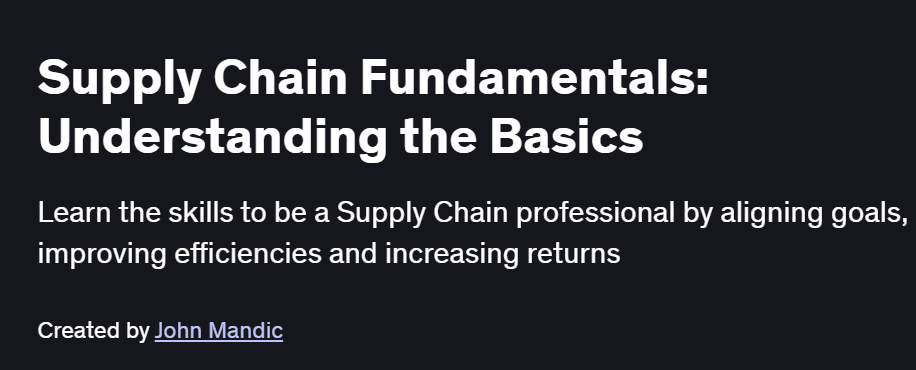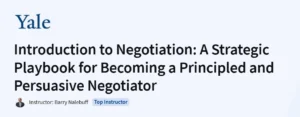What will you in Supply Chain Fundamentals: Understanding the Basics Course
- Understand the fundamentals of supply chain management.
- Learn to identify and forecast demand patterns.
- Gain insights into manufacturing strategies and production planning.
- Master material requirements planning (MRP) and capacity planning.
- Implement effective inventory management techniques.
- Apply strategies to reduce costs and improve efficiency in supply chain operations.
Program Overview
Module 1: Introduction to Supply Chain Management
⏳ 30 minutes
Overview of supply chain management and its importance.
Key components and processes in a supply chain.
The role of a supply chain expert in an organization.
Module 2: Demand Forecasting
⏳ 45 minutes
Understanding different types of demand.
Techniques for forecasting demand accurately.
Identifying and analyzing demand patterns.
Module 3: Manufacturing Strategies
⏳ 45 minutes
Different manufacturing strategies and their applications.
Aligning manufacturing strategies with business goals.
Understanding the product life cycle and its impact on manufacturing.
Module 4: Production Planning
⏳ 1 hour
Developing a production plan.
Resource requirements planning (RRP) and capacity planning.
Creating a master production schedule (MPS).
Implementing rough-cut capacity planning (RCCP).
Module 5: Material Requirements Planning (MRP)
⏳ 1 hour
Understanding the concept of MRP.
Bill of materials (BOM) and its importance.
MRP logic and lead-time offsetting.
Using MRP software for planning and scheduling.
Module 6: Inventory Management
⏳ 1 hour
Types of inventory and their roles.
Inventory carrying costs and ordering costs.
Economic order quantity (EOQ) and its calculation.
ABC analysis and Pareto’s law.
Module 7: Cost Reduction Strategies
⏳ 45 minutes
Identifying areas for cost reduction in the supply chain.
Implementing lean manufacturing principles.
Utilizing technology for process improvement.
Measuring and monitoring cost-saving initiatives.
Get certificate
Job Outlook
Project management is a critical skill across various industries, including construction, IT, healthcare, and finance.
Certified project managers often earn competitive salaries and have opportunities for career advancement.
The demand for skilled project managers is expected to grow as organizations continue to undertake complex projects.
Specification: Supply Chain Fundamentals: Understanding the Basics
|
FAQs
- No prior logistics or business background required.
- Designed for beginners and career changers.
- Explains terms like procurement, logistics, and inventory clearly.
- Suitable for students, entrepreneurs, and professionals.
- Builds a foundation for advanced supply chain studies.
- Teaches how to manage procurement and sourcing.
- Helps reduce costs through efficient inventory control.
- Shows how to streamline supplier relationships.
- Improves delivery and customer satisfaction.
- Practical for startups and SMEs.
- Explains how globalization affects supply chains.
- Introduces risks like delays, shortages, and disruptions.
- Provides strategies for supply chain resilience.
- Discusses how global trade influences local businesses.
- Builds awareness of risk management basics.
- Builds employable supply chain skills.
- Useful for roles in logistics, procurement, and operations.
- Adds value to resumes and interviews.
- Strengthens understanding of business efficiency.
- Acts as a stepping stone for advanced SCM certifications.
- Includes real-world business examples.
- Shows supply chain concepts in action.
- Provides practical applications beyond theory.
- Helps learners connect lessons to workplace scenarios.
- Encourages critical thinking in problem-solving.





